Switches or Dials?
https://savethemarriage.com/stmblog/wp-content/themes/corpus/images/empty/thumbnail.jpg 150 150 Lee H. Baucom, Ph.D. Lee H. Baucom, Ph.D. https://secure.gravatar.com/avatar/669b7e375d93f77521ddaba08adb8063?s=96&d=blank&r=pg No, this isn’t some electrical engineering idea. Instead, it has more to do with human nature.
No, this isn’t some electrical engineering idea. Instead, it has more to do with human nature.
We often want to find the switch, the on/off switch for some situation. Turn off stress by doing this, turn on fitness by doing this. On or off. With a switch.
This causes us to be looking for some super-easy, simple solution… often to complex issues. Particularly when it is a marriage crisis.
A marriage — much less a marriage crisis — is not an on/off situation, and no simple switch will turn it around.
Yet that is what many people want. The solution that is as easy as flipping a switch.
Yes, your marriage can be saved and improved, but not with some simple switch. Instead, think about it as dials. Instead of a master switch, there can be a number of dials. Dialing up connection. Dialing down conflict. Dialing up warmth. Dialing down resentment.
We discuss this tendency to look for a switch — and the need to focus on the dials — in this episode of the Save The Marriage Podcast.
Listen below.
RELATED RESOURCES
Why Connection is so Important
Dangerous Tricks
The No-Contact Rule
3C Approach
Save The Marriage System
Podcast: Play in new window | Download
Subscribe: RSS



